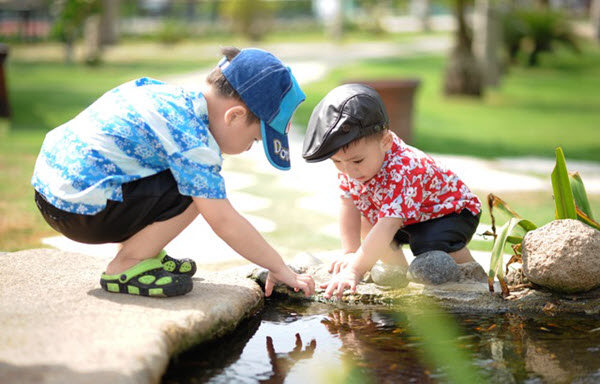What You Need To Know About Teaching Children Values

Supposing you found out that there is something you could have done for your children to make their life so much easier and save them years of angst.
How would you feel?
We all want to make sure our kids live a comfortable life as much as possible so we work really hard. We want to make sure they eat on time and that they have nice clothes to wear.
In our hard effort to provide for them, there’s one thing a lot of parents forget to give their kids.
Values.
Little word, but big impact on your life.
Values are the principles and standards of behavior that one feels strongly about. They are different for everyone, but everyone has his own unique set of values. This includes generosity, giving, kindness, compassion, integrity, and honesty.

So, why do I think values are an important thing to teach your kids? Why do I think that knowing values is essential for kids to know?
Well, think about it.
1. Your child will know exactly why they feel good or bad about something someone is doing
2. Your child will know exactly why their or someone else’s behavior made them feel the way it did
3. Your child will be able to work out quickly and easily who to hang out with
4. Your child will be able to work out exactly who to avoid
5. Your child will know what’s important to him
6. Your child will be able to make decisions based on what’s important to him
7. Most of all, your child will be able to live in alignment with what’s important to him
As adults, we spend most of our lives trying to figure out what’s important to us. We try hard to work out why we feel bad or good about something and why people keep letting us down. We are often baffled whenever someone behaves “badly”.
It all comes down to teaching children values.
The Importance of Knowing Your Values
If you know that honesty is important to you, you’ll know why you get so triggered when someone tries to manipulate you. The other person may not see it as manipulation, but it lands that way for you. It gives you a clear vision of what’s happening, why you’re reacting the way you are and why other people are reacting the way they are.
Knowing your values gives you an infinitely better control over your life and an amazing clarity and understanding. As a result, you make fewer mistakes.
Living with your values in mind means that you’re living in alignment with what’s important to you. Therefore, it allows you to be who you really are.
How do you think that’s going to impact you? Do you think you might find life more enjoyable? Easier? Happier?
Ponder for a moment on how much time we all spend with our kids trying to comfort them when they’ve been upset about someone or something they’ve done. Imagine the times we spend trying to explain to them why they shouldn’t have done something or they should have done something else.
Since your child knows their values and understands what their values mean, they’ll need very little of that support from you because they understand why they feel that way. Hence, they’re saved a lot of pain.
As a parent, the effort that you need to put into dealing with things that happen in your child’s life is cut down tremendously. As a result, they become way more independent and way more certain of themselves and life in general.
How To Work Out Your Own Values
Before you can teach your child their values, you’ve got to work out your own! Here’s what to do:
1. Write down a list of all the things that are important to you, like happiness, love, compassion, learning and integrity. You may find that there are things you don’t like that come to mind more easily and that’s okay. Just write them down and think about what they might be going against.
 2. Now, write a list of all the things that you need to have & do that are important to you. It could include financial freedom, engage in team sports, be successful in your career or go on holidays regularly. There are tons of things that can come to your mind so make sure you write everything down.
2. Now, write a list of all the things that you need to have & do that are important to you. It could include financial freedom, engage in team sports, be successful in your career or go on holidays regularly. There are tons of things that can come to your mind so make sure you write everything down.
3. Next, write a list of the things that are important for you to be known for, like being known for always smiling or for keeping your word.
4. Go through each list and whittle everything you’ve written down to one word. Take, for example, the importance of being known for smiling. You can consider that as “love” or “kindness”.
5. Amalgamate all the lists into one big point. Consequently, you’ll find that there are lots of repetitions across the lists. That should be an indicator of how important that thing is to you.
6. Put the items on the list into an order of importance. It probably won’t be that easy so take your time assessing the list.
7. At this point, it’s crucial that you put them in actual order of importance and not the importance you think they ought to be in. I spent years thinking that family had to be at the top of my list because that’s where it would be if I was a good mother.
Don’t do it. Your list will only work for you if you’re being completely honest so don’t judge yourself.
8. Take the top 7-10 things on your list and write them on a new piece of paper. They’re your core values so they are the ones that should mean the most to you.
9. Pin the list up somewhere visible to you and hone it down over the next few days or weeks. Ultimately, things may change subtly and the order may change over time.
You may realize that some of the things you didn’t think were so important are actually crucial. That happens. In fact, it’s an ongoing thing.
10. Finally, do the same thing with your child.
See Also: The Problem of the Perfect Parent
Whenever something happens in your life that causes you to stop and think, assess it from the list of values. Get into the habit of relating what’s happening back to your list of values.
As a result, you’ll find your life becoming smoother because you’ll be making decisions from a point of alignment with what’s important to you.
Imagine how much easier a child’s life would be if they could grow up being able to do that.
See Also: Top 10 Tips to Help Children Develop Useful Habits
Karen O'Connor
After 10 years of trying, I finally admitted that being a stay at home mum wasn't for me. Now I'm a writer, blogger, mindset expansion expert, property developer and entrepreneur, and a much happier wife and mum.


